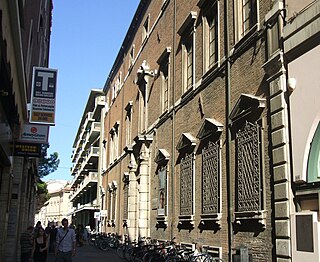
The cinema of Italy comprises the films made within Italy or by Italian directors. Since its beginning, Italian cinema has influenced film movements worldwide. Italy is one of the birthplaces of art cinema and the stylistic aspect of film has been one of the most important factors in the history of Italian film. As of 2018, Italian films have won 14 Academy Awards for Best Foreign Language Film as well as 12 Palmes d'Or, one Academy Award for Best Picture and many Golden Lions and Golden Bears.

The French Foreign Legion is an elite corps of the French Army that consists of several specialties: infantry, cavalry, engineers, and airborne troops. It was created in 1831 to allow foreign nationals into the French Army. It formed part of the Armée d’Afrique, the French Army's units associated with France's colonial project in North Africa, until the end of the Algerian War in 1962.

Federico Fellini was an Italian film director and screenwriter. He is known for his distinctive style, which blends fantasy and baroque images with earthiness. He is recognized as one of the greatest and most influential filmmakers of all time. His films have ranked highly in critical polls such as that of Cahiers du Cinéma and Sight & Sound, which lists his 1963 film 8+1⁄2 as the 10th-greatest film.

San Marino, officially the Republic of San Marino and also known as the Most Serene Republic of San Marino, is a European microstate surrounded by Italy. Located on the northeastern side of the Apennine Mountains, it is the fifth-smallest country in the world, with a land area of just over 61 km2 and a population of 33,642, as of 2023.

The Republic of San Marino's public transport network consists of a local bus network and the Funivia di San Marino, an aerial cablecar system between Borgo Maggiore and the City of San Marino. Both means are operated by the Azienda Autonoma di Stato per i Servizi Pubblici, the Sammarinese state company for public transport.

Rimini is a city in the Emilia-Romagna region of Northern Italy.

The National Order of the Legion of Honour, formerly the Imperial Order of the Legion of Honour, is the highest French order of merit, both military and civil, and currently comprises five classes. Established in 1802 by Napoleon Bonaparte, it has been retained by all later French governments and regimes.

Pesaro is a comune (municipality) in the Italian region of Marche, capital of the province of Pesaro and Urbino, on the Adriatic Sea. According to the 2011 census, its population was 95,011, making it the second most populous city in the Marche, after Ancona. Pesaro was dubbed the "Cycling City" by the Italian environmentalist association Legambiente in recognition of its extensive network of bicycle paths and promotion of cycling. It is also known as "City of Music", for it is the birthplace of the composer Gioachino Rossini. In 2015 the Italian Government applied for Pesaro to be declared a "Creative City" in UNESCO's World Heritage Sites. In 2017 Pesaro received the European City of Sport award together with Aosta, Cagliari and Vicenza.

L'Inferno is a 1911 Italian silent film, loosely adapted from Inferno, the first canticle of Dante Alighieri's Divine Comedy. L'Inferno took over three years to make, and was the first full-length Italian feature film.

Cattolica is a town and comune in the Province of Rimini, Italy, with 16,233 inhabitants as of 2007.

Abbott and Costello in the Foreign Legion is a black and white 1950 American comedy film directed by Charles Lamont and starring the comedy team of Abbott and Costello.

Emilio Luigi Carlo Giuseppe Maria Ghione, known as Emilio Ghione, was an Italian silent film actor, director and screenwriter. Ghione was best known for writing, directing, and starring in the Za La Mort series of adventure films, in which Ghione played a likeable French Apache and 'honest outlaw'. Ghione directed, wrote, and acted in every genre of film, and directed some of the most famous stars of the time, including Francesca Bertini, Lina Cavalieri, Alberto Collo, and Hesperia. After his final film role in 1926, Ghione briefly performed on a theatrical tour of Italy. Ghione wrote three novels based around his Za La Mort character, an autobiography, and an essay on Italian Silent Cinema, before his death from tuberculosis in 1930.

The Globo d'oro is an Italian annual film award. It was founded in 1959 by the Foreign Press Association in Italy. The Globo d'oro Awards for Italian cinema are given by the Foreign Press.

The Foreign Legion is a 1928 American silent adventure film directed by Edward Sloman and starring Norman Kerry, Lewis Stone, and Mary Nolan. The film is based on the 1913 novel The Red Mirage by I.A.R. Wylie. It was one of several Foreign Legion-themed films produced in the wake of the successful 1926 film Beau Geste. The production cost around $250,000, but was the subject of diplomatic protests from French authorities due to its depiction of brutality.

The Biblioteca Civica Gambalunga, also known as the Gambalunghiana, is a public library in Rimini, in the region of Emilia-Romagna, northern Italy.

Sergio Wolmar Zavoli was an Italian sports and documentary journalist and politician.
The Triple-Headed Lady is a 1901 French silent trick film by Georges Méliès. It was sold by Méliès's Star Film Company and is numbered 334 in its catalogues.
Crying and Laughing is a 1900 French short silent film by Georges Méliès. It was sold by Méliès's Star Film Company and is numbered 306 in its catalogues.
Cineteca Nazionale is a film archive located in Rome, Italy. It was founded in 1949. By law it manages the so-called legal deposit, with the task of collecting, preserving and disseminating the productions of Italian cinema. It is the only Italian film library that enjoys the right of mandatory legal deposit of all films produced and co-produced in Italy and registered in the Public Film Register held by the SIAE. It is part of the nonprofit foundation Centro Sperimentale di Cinematografia.
Cineteca Italiana is a private film archive located in Milan, Italy, established in 1947, and as a foundation in 1996.